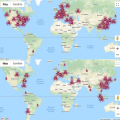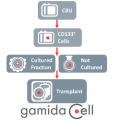You are here
News
2020
Aug 2020 In this article we set the record straight about the correct numbers of cumulative or currently recruiting clinical trials that utilize cord blood or cord tissue.
Jul 2020 Exclusive scoop from Dr. Joanne Kurtzberg: The Duke ACT study of Cord Blood for Autism shows significant benefit for children ages 4-7 with non-verbal IQ above 70.
Jul 2020 Simplified highlights for parents: The Duke ACT study of Cord Blood for Autism shows significant benefit for children ages 4-7 with non-verbal IQ above 70.
Jun 2020 Here is a rare story where the father’s stem cells were a perfect match to his daughter and saved the child from a potentially life threatening disorder. The parents' decision to enroll in a Community cord blood stem cell bank covered all the transplant related costs of their child’s medical care.
Jun 2020 Gamida Cell has demonstrated that a stand-alone transplant of expanded cord blood can dramatically shorten engraftment time. We are entering a second generation of cord blood transplants, using products that will hopefully become a routine option for stem cell transplant patients.
May 2020 Renee tells the story of how her son Gage benefited from infusions of cord tissue MSC to treat his autism. Before the therapy, Gage was non-verbal and seemed "stuck inside his own head". Since the MSC therapy, his language and social skills have noticably improved. Today, Gage is very talkative and plays with other children.
May 2020 The coronavirus pandemic has been both helpful and harmful for the stem cell industry, and cord blood banks in particular. The challenge for companies that bank newborn stem cells is to survive the downsides and take advantage of the new possibilities.
Apr 2020 Pregnant women are "at risk" for severe symptoms from coronavirus and should take extra precautions. Cord Blood and Birth Tissues should not contain COVID-19. It is well established that respiratory viruses do not show up in the blood. A small number of babies may be born with coronavirus if mom is sick at the time of birth, but most newborns do not have it, and most of those that do recover quickly. If mom has had coronavirus and recovered, then her immunity will protect her newborn baby. Inside cord blood laboratories, it is business as usual. The challenges facing cord blood banks during a pandemic are the logistics of shipping samples and protecting their staff.
Apr 2020 Genetic screening and tests are "actionable" when they identify risks for conditions that can be prevented, treated, or managed more efficiently with early detection. Despite great advances in genetic testing, there are discrepancies between the scope and quality of testing available from different providers.
Mar 2020 Maksim and his twin sister were born 7 years ago. Despite a normal birth, signs emerged that Maksim had autism: he could not speak and did not interact with people. His mother stayed home to educate the children and the family tried various experimental therapies, but nothing helped. Then, they learned of cord blood therapy for autism. Maksim has been treated with both his own cord blood and his sister’s cord blood. Since the cord blood therapy, Maksim has begun to speak, and is able to attend school. His mother feels a huge burden has been lifted.










